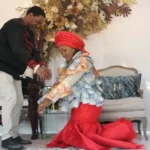President Emmerson Mnangagwa’s recent announcement of his intention to step down in 2028 has sent shockwaves through the ruling Zanu-PF party, igniting a fierce battle for succession and throwing the country’s political landscape into disarray.
While the President has stated his commitment to adhering to the constitution and relinquishing power after his second term, the Zanu-PF youth league, a powerful force within the party, is pushing for him to remain in power beyond 2028. This move has intensified the already heated debate within Zanu-PF, with various factions vying for control and sceptics questioning Mnangagwa’s true intentions.
The youth league’s fervent support for Mnangagwa’s extended rule underscores the generational divide within the party. Many young members view Mnangagwa as a stabilising force, capable of steering the party and the country through a challenging economic and political landscape. Their support for his extended rule is based on the belief that continuity in leadership is essential for ongoing development projects and economic recovery efforts.
However, the youth league’s call for Mnangagwa to remain in power has been met with resistance from both within and outside the party. Political opponents and critics suggest that Mnangagwa’s retirement announcement might be a strategic manoeuvre to quell succession debates while he explores ways to extend his presidency.
The slogan “2030 vaMnangagwa vanenge vachipo vachitonga” (Mnangagwa will still be in power in 2030), first introduced by Masvingo province during the national Youth Day held at Mushagashe Vocational Training Centre in February this year, has become a rallying cry at every Zanu-PF function. In a move that further fuelled speculation, Mnangagwa demanded all ministers present at a function in Chivhu to chant the slogan.
The sudden change by Mnangagwa, who seemingly enjoyed the “2030 slogan”, to then publicly announce that he will abide by the constitution and step down after his second term comes to an end in 2028, is seen by many as evidence of the alleged succession factional fights within the ruling party.
Various political analysts have expressed their doubts about Mnangagwa’s genuineness, suggesting that his announcement was a calculated move to quell the internal turmoil within Zanu-PF.
Professor Eldred Masunungure, a prominent political analyst, believes that Mnangagwa’s statement was a tactic to douse the flames of factionalism within the party. “I would not take the President’s pronouncement seriously at a time when his core supporters are publicly and unashamedly agitating for a third term or alternatively, an extension of the current term,” said Professor Masunungure. “The “ED2030″ campaign is still in full swing. As such, the declaration about retiring in 2028 and a replacement chosen at Congress, sounds rather hollow and ingenious.”
He added, “I think it’s meant to douse the fires of factionalism that threaten to rip the party asunder if not properly and quickly managed. Thus, the President’s retirement announcement has little do with him being a constitutionalist because whether he goes for a third term or an extension of the second term, he would still have to go through some constitutional stages to amend the supreme law.”
Dr Wellington Gadzikwa, another analyst, echoed Professor Masunungure’s sentiments, stating that Mnangagwa’s announcement was not a sign of his newfound commitment to the constitution but rather a recognition of the public’s opposition to his extended rule.
“His announcement that he will step down was not because he is a constitutionalist because we have seen a number of instances when the constitution was disregarded,” said Dr Gadzikwa. “We have seen the capture of the constitutional bodies. He realised that people would not allow him to extend his term and those who had been calling for the extension of the term in the party will have to eat a humble pie and accept the reality that he cannot go beyond 2028.”
However, not all analysts share this view. Professor Charles Pfukwa, a political commentator, believes that Mnangagwa’s statement is genuine and aligns with the Zimbabwean constitution.
“There is nothing amiss about what he said because that’s what the constitution says,” said Professor Pfukwa. “That is a political and timely statement which has come at a right time when people were pushing for him to extend his tenure. What was being said by party supporters were just political statements. Anything can happen between now and 2028 and if the parliament wishes to amend the constitution in his favour then so be it. There are procedures that has to be followed and they know what has to be done.”
Dr Gift Gwindingwe, a Media Lecturer at Great Zimbabwe University, also believes that Mnangagwa’s statement is genuine. “The President is not under pressure from any corner so what he said becomes believable,” said Dr Gwindingwe. “I have been following debates on social media spaces with people saying he is not genuine but what makes people say he is not genuine when he is saying it himself especially against what his supporters are saying. It becomes easier to believe what the President is saying than to believe what the supporters are saying.”
Despite the President’s announcement, Masvingo province remains steadfast in its call for Mnangagwa’s term extension. Robson Mavhenyengwa, the Zanu-PF Masvingo Provincial Chairperson, stated that while the President has announced his wish to step down, the province will discuss the way forward at an inter-district meeting scheduled for Saturday, July 13th at Masvingo Polytechnic.
“We are going to have an inter-district meeting at Masvingo Poly on Saturday and where we are going to have the National Political Commissar Cde Munyaradzi Machacha,” said Mavhenyengwa. “That is where we are going to discuss more and you can come and hear for yourself.”
Commenting on the resolutions being made by Zanu-PF supporters in various provinces that Mnangagwa should have a third term, legal expert Professor Lovemore Madhuku dismissed the possibility of the constitution being amended to allow for a third term.
“That is irrelevant, the constitution cannot be changed now,” said Professor Madhuku. “Whether the President wants to or not, he has to step down. The announcement of his retirement is not a voluntary act but a constitutional dictate. The people who are pushing for his third term assume they have power to change the constitution but it is too late for that now.”












